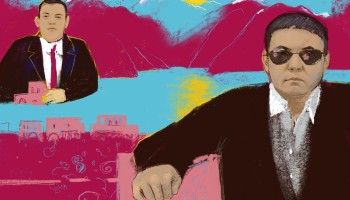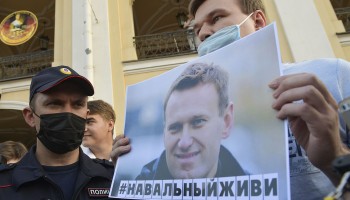But she decided not to prod.
Investigating the minister’s ability to afford his 107 square meter apartment in Belgrade, Serbia’s anti-corruption agency grew suspicious after Vulin explained that his wife’s aunt from Canada lent the couple €205,000 (US$ 245,000) to buy it and submitted unconvincing evidence for his claim, OCCRP partner, the Crime and Corruption Reporting Network (KRIK) reported last month.
To prove it, he submitted to the agency a ten-year loan agreement, signed by his wife, confirming that she received the money. The signature from the purported aunt in Canada was missing, however.
Vulin further submitted a document with the signature of the apartment’s seller who lives in Marbella, a city in Spain notorious for money laundering. He claimed that he paid off the apartment a day after the contract was verified.
But Vulin’s account number was missing. The agency deemed the document invalid and reported its findings to the police for further investigation.
But police investigators neither questioned Vulin, nor managed to track down the mysterious generous aunt in Canada.
Instead, they spoke to Vulin’s wife, his friend who sold him the apartment and the friend’s son. These statements were all that the police submitted to the prosecution.
Although Prosecutor Ristic could have ordered further investigation, she chose to close the case, accepting Vulin’s suspicious explanations and evidence which the anti-corruption agency previously dismissed.
During the process, Vulin was twice appointed as defense minister and avoided any media inquiries regarding his property.
Experts who spoke to KRIK concluded that both police and prosecution were determined to close the case rather than find out the truth.
Prosecution urged the police three times to investigate the case more thoroughly, but they reacted only after a year and a half when the public already found out that the case exists.
Meanwhile, a new chief prosecutor was appointed – a lawyer who got the job thanks to the votes of the lawmakers from the ruling part. The opposition voted against him because they believed he is to close to the regime.
He gave the case to Ristic who in her decision, which KRIK obtained through the Freedom of Information act, wrote, "in my opinion, there are no elements of criminal acts of misuse of office or accepting bribery in the actions of Aleksandar Vulin.”
Vulin’s wife confirmed her husband’s story about the the loan from her aunt Mira Milic who lives in Canada, and also claimed that they intend to pay it back.
She showed them the receipt lacking the aunt’s signature. Her aunt, she said, gave her the cash in Belgrade but authorities found that no such amount was declared to customs.
The fact that the money was not declared when it crossed the border does not prove a suspicious source, the Prosecutor wrote in her decison.
KRIK reporters called several persons by the name Mira Milic in Canada but none of them were Ms. Vulin’s aunt.
Natasa Vulin never answered KRIK’s calls.
Would the prosecution had questioned Minister Vulin, he may have offered a different explanation than his wife’s, KRIK claims.
Vulin told KRIK that he personally brought the cash from Canada in batches of 9,000 Euro, which is within the legal limit and does not have to be declared to customs.
KRIK calculated that if this is true, he must have traveled to Canada 23 times.
Both police and prosecution ignored the part of the anti-corruption agency’s report about a dubious one million Euro deal Vulin made while he was heading Serbia’s office for Kosovo.
He approved the purchase and installation of security cameras in Kosovska Mitrovica, and the job was given without a tender procedure to a company whose owner is Vulin’s friend.
The money was paid in advance but it is not clear how many cameras were actually installed, the anti-corruption agency said in its initial report to the police. It noted that this deal has to be investigated because it may be connected to the cash that was used to pay for Vulin’s apartment.
The prosecution, however, concluded that an investigation was not necessary since it was already established where the cash came from – the aunt.
The Agency also noted in its report that even if it would be true that Vulin borrowed the money from the aunt, it is questionable whether he and his wife can pay it back in 10 years having in mind their monthly income.
“Money has to have a source and this amount doesn’t,” said Jelisaveta Vasilic, a member of the Council for the fight against corruption.
“This raises suspicions of a criminal act,” she said, adding that the cash payment hints money laundering.






